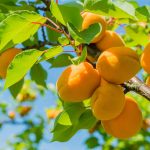 The seed-bearing organ, with or without adnate parts.
The seed-bearing organ, with or without adnate parts.
A ripened ovary along with any other structures that may ripen with it and form a unit with it.
The fleshy seed-bearing part of plants (including tomato and cucumber, which are usually called vegetables).
On one hand the expression to enjoy the fruits of your labour is a metaphor because what you are enjoying may not actually be fruit; on the other hand, the expression is quite literal because the word fruit derives from a Latin source, frui, meaning to enjoy. The ancient Romans applied this word—or rather a derivative of it, fructus—to cherries, oranges, apples, and so forth because nature provides those fruits for our enjoyment. Several other English words also derive from the Latin frui. Fruition, for example, appeared in the early fifteenth century as a synonym for enjoyment; thus, a statement such as “My hard work will soon come to fruition” means “My hard work will soon come to the point where I can enjoy it.” More surprising is that the word frugal also derives from frui, even though frugal people might seem ill-disposed to enjoy anything. However, frugal did indeed acquire its current thrifty meaning thanks to a series of gradual shifts in sense: enjoyable things are profitable things, and profitable things are economical things, and economical things are thrifty things. As a result of these semantic shifts, which occurred over centuries, frugal shifted its meaning from enjoyable to thrifty.
The matured or ripened ovary, together with any other parts that develop with it, containing one or more seeds.
The ovary and its contents after the fertilization of the ovules.
The matured ovary and everything connected with it.
The dry or fleshy case, surrounding a plant’s seeds, that is formed from the ovary wall.
The part of the plant which carries the seed or seeds, and which arises after the flower is pollinated. It may or may not be edible.
The ripened ovary of a flowering plant, containing seeds.
A matured ovary. The structure with the enclosed seeds.
A ripened ovary (or group of ovaries) containing seeds, together with any adjacent parts that may be found with it at maturity.
The part of the plant which contains the seed or seeds: in the strict sense of the term, fruits are found only on flowering plants, developing from the fertilized ovary of the flower. A fruit may or may not be edible; some of the edible ‘fruits’ are in fact false fruits, for example, apples, strawberries, consisting largely of tissues derived from the floral receptacle, not the ovary. The plural of fruit is fruits when considered as different kinds, fruit when considered in a mass.
The ripened ovary of a seed-bearing plant and the surrounding tissue, such as the pod of a bean, nut, grain, or berry.
The ripe seeds and their surrounding structures, which can be fleshy or dry.
From a botanical perspective, a fruit is the reproductive part of a plant that bears seeds. However, in culinary terms, the term “fruit” refers to the edible portions of a plant that are commonly served as a dessert course during a meal.
The entities housing mature seeds. These structures exhibit diversity in their shape, size, and fleshy attributes.
